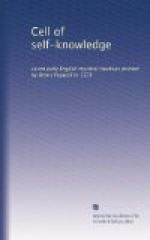not alway last in the feeling of that ghostly joy,
for the corruption of the flesh, of the which corruption
sin is the cause; then he riseth with a strong feeling
of hatred against all sin and all kind of sin.
This feeling taught David us to have, where he saith
in the psalm: “Be ye wroth and will ye
not sin";[86] that is thus to mean: Be ye wroth
with the sin, but not with the kind.[87] For kind
stirreth to the deed, but not to sin. And here
it is to wete that this wrath and this hatred is not
contrary to charity, but charity teacheth how it shall
be had both in a man’s self and in his even
Christian;[88] for a man should [not] hate sin [so
that he destroy his kind, but so that he destroy the
sin and the appetite of sin] in his kind. And,
as against our even Christian, we ought to hate sin
in him, and to love him; and of this hatred speaketh
David in the psalm, where he saith thus: “With
perfect hatred I hated them."[89] And in another psalm
he saith that “he had in hatred all wicked ways."[90]
Thus it is well proved that, ere Zebulun was born,
Judah and Issachar were both born. For but if
a man have had charity and ghostly joy in his feeling
first, he may in no wise feel this perfect hatred
of sin in his affection. For Judah, that is to
say, charity, teacheth us how we shall hate sin in
ourself and in our brethren; and Issachar, that is
to say, ghostly feeling of joy in God, teacheth us
why we shall hate sin in ourself and in our brethren.
Judah biddeth us hate sin and love the kind; and Issachar
biddeth us destroy the sin and save the kind; and thus
it falleth for to be that the kind may be made strong
in God and in ghostly things by perfect hatred and
destroying of sin. And therefore is Zebulun cleped
in the story “a dwelling stead of strength."[91]
And Leah said in his birth: “My husband
shall now dwell with me";[92] and so it is that God,
that is the true husband of our soul, is dwelling
in that soul, strengthening it in the affection with
ghostly joy and sweetness in His love, that travaileth
busily to destroy sin in himself and in others by perfect
hatred of the sin and all the kind of sin. And
thus it is said how Zebulun is born.
CAPITULUM IX
HOW ORDAINED SHAME RISETH AND GROWETH IN THE AFFECTION
But though all that a soul through grace feel
in it perfect hatred of sin, whether it may yet live
without sin? Nay, sikerly;[93] and therefore
let no man presume of himself, when the Apostle saith
thus: “If we say that we have no sin, we
deceive ourself, and soothfastness is not in us."[94]
And also saint Austin saith that he dare well say
that there is no man living without sin.[95] And I
pray thee, who is he that sinneth not in ignorance?
Yea, and oft times it falleth that God suffereth those
men to fall full grievously by the which He hath ordained
other men’s errors to be righted, that they
may learn by their own falling how merciful they shall




